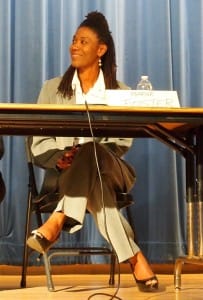Candidate Marne Foster Aims to Improve SDUSD

Marne Foster at FilAm Festival

The San Diego Unified School District Board of Education has one seat vacant in this election cycle. Long-time trustee Shelia Jackson is retiring from her duties as a representative for sub-district E. Marne Foster is running for that seat, which represents southeast San Diego. She believes her parent involvement and educational tact makes her a fit school board candidate.
Marne Foster is a parent of four children. Two are on full college scholarships: a daughter at Pepperdine University, and a son at Rutgers University. Her two younger sons are currently attending San Diego Unified schools. Ms. Foster herself attended SDUSD schools; Encanto Elementary, Gompers Junior and High School. She has been a parent facilitator for the Parent Institute for Quality Education (PIQE) for twenty years.
"I have volunteered at all my children's schools and led fundraisers," said Ms. Foster when asked about her own parent involvement.
She has one child who has special needs. When her child was denied Individual Education Program (IEP) rights, she fought to have that decision overturned. She won that fight and ended at the California Department of Education.
Sub-district E is a lower-income area of San Diego. While the district struggles to fund its schools, Marne Foster wants its leaders to be more active in gathering resources outside of the district budget.
"It’s also really important to hire a grant writer. That’s a powerful investment that’s proven to pay off." San Diego voters are likely to look for substantive ideas from school board candidates. Marne Foster at Marston Middle School

Marne Foster recognizes that money alone does not make a quality school. At every discussion, she explains her idea of schools as "educational hubs." This creates collaboration between school sites and non-profit organizations to provide mentoring and recreation. When working with outside organizations, she sees the school district:
Boys to MenReality Changers
An invaluable resource to K-12 schools is the student's parent. Ms. Foster is an active parent, but makes suggestions for increasing parent involvement:
One way we can do that is to have a heavily engaged and involved parent, like I have been. Get parents the training they need so they can do outreach to other parents in the community that they already have a relationship with. Empowering the parents and putting them in leadership positions to empower other parents.
Parent-teacher collaboration and parent outreach can have positive effects on student achievement. Lincoln High School, which re-opened in 2007 after being rebuilt, is struggling with student achievement. Marne Foster notes that of fifty percent of students have test scores that are below basic. Five-percent of Lincoln's students are proficient in math, and a quarter of 10th graders are not passing. Marne Foster does not leave the discussion with the daunting statistics. She offers possible solutions:
We have to have mentor teachers and peer teachers, we have to have transformational leadership one that motivates and inspires. That's what can happen with Professional Learning Communities. We know what we need to do, it needs to be implemented and monitored and folks need to be held accountable. Not just the teachers but what about the parents? It takes parent engagement as well.
Measuring student achievement is another point of contention at school board discussions. While the school cannot rely on test scores alone, the school must also find a way to take subjective elements of learning into account. Marne Foster responds to this dilemma:
The Crucible
She also addresses students who are behind on achievement:
We have to accelerate their learning. It's not that they don't know all math, language arts, or science. There are specific deficiencies in that need to be assessed. We need targeted instruction to accelerate their learning so they are prepared by the time they graduate.
Marne Foster teaches at San Diego Community College Continuing Education (SDCE). She has been an instructor for fourteen years, helping adults transition into the professional world. She is also an administrator with the responsibility of the school's accreditation. The SDCE recently received a perfect score in its accreditation process from state evaluators.
In the June primary election, Marne Foster obtained 62-percent of the vote against William Ponder. The primary election was restricted to voters in sub-district E. However, voters in all of San Diego Unified will be pitching for the next school board member on November 6.
For more information on SDSU candidate Bill Ponder, Foster's opposition, click here.



